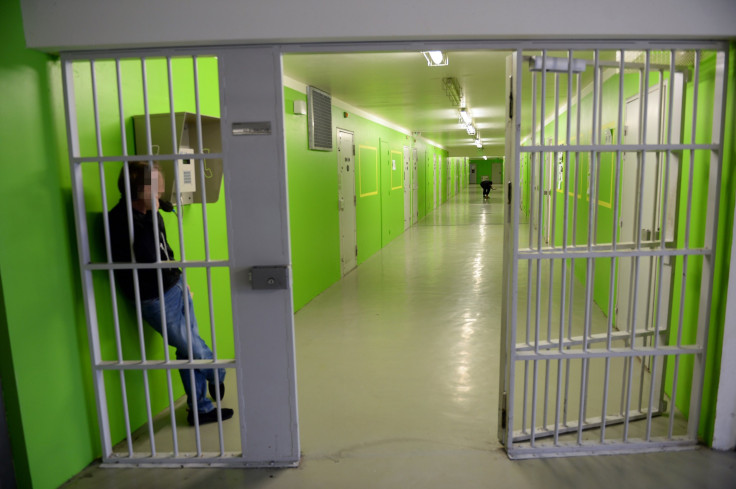FCC Will Cap Prison Phone Rates, And That's Bad News For These Two Tech Companies

Every time Joanne Jones picks up the phone to call her son in Texas, she cringes thinking about how much it will cost her. That’s because Jones’ son, Nate, is currently locked up in a Texas county jail -- and jail phone calls are notoriously expensive. A 15-minute call costs Jones $10, not including additional fees she’ll be charged.
But that may soon change. Today, regulators at the Federal Communications Commission are expected to vote on new rules that will cap the phone rates and fees private prison companies are allowed to charge inmates and their families. The ruling will dismantle a lucrative partnership between U.S. prisons and the two private tech companies that dominate the prison calling business, Securus Technologies and Global Tel*Link (GTL).
[Update, 10/22: The FCC ruling passed.]
Since the early 1990s, when private companies took over jail and prison phones, the prices to keep in touch have soared. That's because cash-strapped jails have contracted with a few tech firms like Securus and GTL to provide calling services to inmates in deals where the jail gets a cut of the proceeds. Some prisons have eliminated old-fashioned phone calls altogether in favor of video calling.
Over the last year, for instance, Jones, who works as an occupational therapist, has spent well over $1,000 to speak with her son, who will face trial on robbery charges later this fall. “The rates are exorbitant,” she said. “People just can’t afford it.”
The new regulations are historic in nature and will disrupt a highly profitable -- and controversial -- industry. They are also a long time coming. After more than a decade of deliberations, the FCC made its first pass at regulation in 2013 by reining in high rates for long-distance calls, but today’s rules far exceed any previous ones by addressing in-state calls and so-called site commissions.
“The FCC has taken on the high rates, brought the hidden fees into the light, and imposed order on this market,” said Peter Wagner, executive director of the Prison Policy Initiative.
FCC Commissioner Mignon Clyburn, who has largely led the charge for more-affordable phone calls, spoke exclusively to International Business Times this past summer. “People should be treated with as much dignity and respect as possible, even if they are incarcerated,” Clyburn said. “They deserve that. I am committed to answer that call.”
The new regulations will cap the average rate of a 15-minute phone call at $1.65, ban excessive ancillary fees and discourage the practice of companies paying site commissions, in which companies give local sheriffs a percentage of jail phone revenues. The rules are expected to go into effect early next year, but the FCC is already bracing for blowback from the companies that are directly impacted by the new rules.
A Business-Ending Event?
For people who don’t regularly deal with the criminal justice system, it may come as a surprise that the prison phone business is so lucrative. But with 2.2 million inmates locked up nationwide, it’s not hard to understand what’s at stake. The industry collects about $1.2 billion in yearly revenues, and because contracts are monopolistic in nature and sell to a literal captive audience, many critics say price-gouging has become rampant. In some states, a 15-minute phone call costs $17.
The FCC regulations, not surprisingly, have the companies on edge.
Recently, a lawyer for Securus Technologies called the incoming regulations a “business-ending” event and said the company will “litigate and appeal [the ruling] aggressively.” In fact, on Oct. 8, Standard & Poor’s placed Securus “on CreditWatch with negative implications” because of the impending regulations.
Over the last year, IBT has been examining the ways in which the two major companies that compete in this market -- Securus and GTL -- have been reacting to the threat of regulations, particularly what would happen if the FCC abolishes site commissions.
The FCC has recognized that this incentive structure results in higher prices for inmates and their families. After all, if companies are giving away a large percentage of call revenues -- in some cases up to 96 percent -- they’ll ultimately need to raise prices on the customer. So, recently, GTL and Securus have gotten creative in their pitches to county jails. If they can't use commissions as a bargaining chip to win local business, it seems they're trying out new schemes.

As IBT reported in July, companies have begun offering million-dollar “signing bonuses” and free computer tablets to county jails in order to win contracts. They’re also diversifying how they make money. In April, IBT reported that Securus was requiring its county jails to remove in-person visitations in favor of its video visitation service, which costs $20 for a 20-minute phone call. (The FCC does not yet regulate video visitations.)
In some cases, contracts have been won using outright bribes. In August, a Mississippi contractor for GTL was indicted by the FBI and later pleaded guilty to charges that he handed over bags of cash to a Department of Corrections official on GTL's behalf. "I’ve been doing this stuff for a while,” Paul Wright, executive director of the Human Rights Defense Center, told IBT earlier this month. “There’s no transparency, and there’s no oversight. I’ve long suspected that there’s bribery to get these contracts.” (GTL claims it did not know about the bribes.)
Sheriffs Don’t Want The Regulations, Either
It’s not just companies and families who have a stake in the regulations; county sheriffs want them too. Right now, the FCC’s order is to “strongly discourage” the use of site commissions, which angers sheriffs, who argue that call revenue is used to offset the costs of providing jail and prison phones.
In May, IBT reported that, should the FCC eliminate commissions, hundreds of wardens may rip the phones from the walls altogether. “It’s very possible that sheriffs could elect to eliminate the calls,” Jonathan Thompson, executive director of the National Sheriffs’ Association, told IBT. “They don’t have to provide a call service.”
Interestingly, the FCC order being voted on today does not explicitly deny the ability to offer commissions; it simply discourages it. This has companies outraged.
In a joint statement submitted to the FCC on Oct. 16, several phone companies urged the FCC to consider the implications of forcing businesses to lower call rates but not explicitly terminating commissions. In essence, the companies know that sheriffs will continue to demand high commissions, but if the FCC reduces the rates they are allowed to charge customers, the companies argue their margins will be squeezed.
Families who spent thousands to keep in touch with loved ones are hardly bothered by the fact that the companies may lose out.
“This is going to make a huge difference in people’s lives,” said Joanne Jones. Still, insiders are cautioning against any victory laps just yet.
“It’s great,” said Josh Gravens, a community activist in Texas. But, he added, “I think the phone companies will sue the minute the rule is made.”
© Copyright IBTimes 2025. All rights reserved.






















